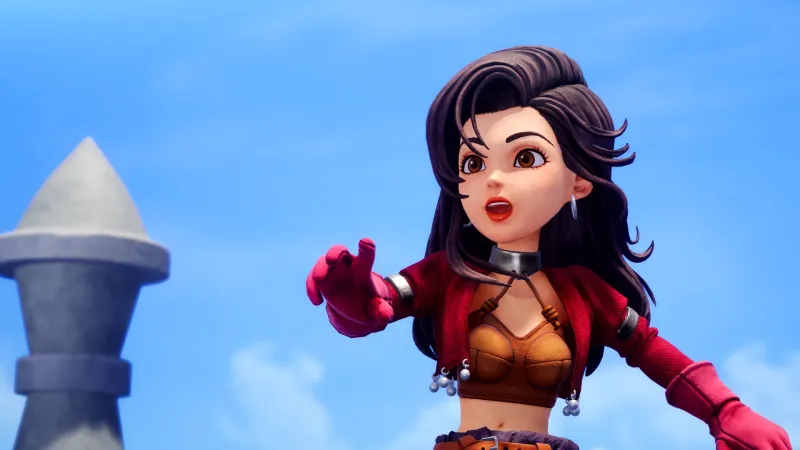
Dragon Quest VII Reimagined is the first version of Dragon Quest VII to feature in-game voice acting, meaning characters like Sir Mervyn, Aishe, Maribel, Prince Kiefer, and even Ruff, will be voiced. Neither the original PlayStation release of Dragon Quest VII nor the 2016 3DS remake featured voice acting, so I asked Reimagined lead scenario writer if this changed how the team approached redesigning the story.
Unsurprisingly, it did.
“Knowing that it was going to have voice over certainly did change the approach of the way I wrote the narrative here,” Sayaka Takagi tells me within Square Enix’s Shibuya offices in Tokyo, Japan. “The original release on PlayStation didn’t have any voiceovers, and it was written [out]. So certainly, the way we wrote the language of the dialogue [in Reimagined] needed to be changed to be more realistic and more modern for modern audiences.”
She says colloquialism played a significant factor in writing Reimagined’s dialogue, because everything needs to sound natural for the various included voice-over options.
I hear first-hand one of these changes when I encounter eventual party member Sir Mervyn at the top of The Tallest Tower dungeon while playing the game. After I awaken him from a special stone to defeat the flying Chimaera surrounding the tower, he does just that before gracefully landing beside my party. It’s here I hear his voice, and it sounds like that of a medieval knight – this isn’t too shocking, considering how he looks.
Sir Mervyn
But in Japanese, he talks like a feudal samurai, Reimagined producer Takeshi Ichikawa, who you can read more about here, says. Another example of this colloquialist effect present in Reimagined comes from Bulgio, an extremely wealthy man who gives Hero the special stone that houses Sir Mervyn. In English, Bulgio mixes Italian words into his English, reflecting the multicultural inspiration present throughout the world of Reimagined. In Japanese, however, that’s not the case – instead of mixing English and Italian, his dialogue instead reflects his character rather than a nationality.
“He’s supposed to be this rich, arrogant guy, and that’s reflected in the dialogue,” Takagi says on the differences between the Japanese localization and the English version, noting her work is focused on the former while other teams handle the latter. “At least for the Japanese version, we didn’t necessarily write dialogue in a way that you can tell what these specific cultural backgrounds are for each character, but we did write dialogue in a way that it’s immediately understandable what kind of personality that character has.”
Takagi adds, “The world of Dragon Quest VII, as you know, is comprised of many different islands, and obviously the dialects on each of those islands tends to differ, so it is a very important part of the story of Dragon Quest VII to ensure that the residents of those islands can reflect the uniqueness and individuality of each of those islands and the cultures they have.”
We’ll get to hear more of these new voices when Dragon Quest VII Reimagined launches on PlayStation 5, Xbox Series X/S, Switch 2, Switch, and PC on February 5, 2026.
In the meantime, check out this article breaking down everything in the Dragon Quest VII Reimagined issue of Game Informer, and be sure to subscribe here if you haven’t yet so you can access the Dragon Quest VII Reimagined cover story, our deep dive into Dragon Quest history with creator Yuji Horii, and so much more. Here are some other stories to check out:
Whose voice are you most excited to hear in Dragon Quest VII Reimagined? Let us know in the comments below!
